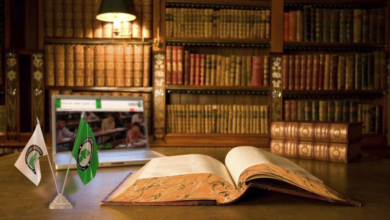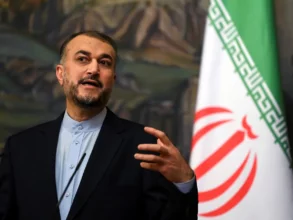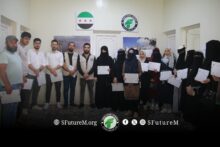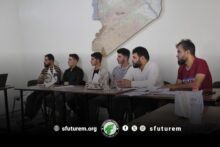“The Turks in the Syrian Market”

Before the revolution, the Turkish-Syrian relationship was at its peak, deeply intertwined to the extent of personal and familial relations between the ruling families of both regimes. The Turks believed this would enable acceptable intervention to end the violence of the Syrian regime against its people. However, the Syrian regime’s deception of Davutoğlu at the time led the Turks to change their policy with Damascus, entering a new phase. The Turks did not choose a zero-problems policy in Syria, as their distance from the Iraq War post-Saddam Hussein was a strategic loss filled by the Iranians. Hence, they decided to align and then intervene alongside the Syrian opposition.
The Turks welcomed Syrians through a policy of openness, brotherhood, and support between migrants and hosts, winning the sympathy of Syrians who did not anticipate this policy turning negative for them later, as it was purely emotionally supportive and not systematically legal. This meant the relationship would later be built on Turkish whims.
With the evolution of the Syrian opposition from peaceful to armed and then Islamist, Turkey was at the forefront of countries coordinating with these field and security developments, handling the Syrian file through several axes:
- Humanitarian, by opening camps and welcoming Syrians, and facilitating international and relief missions.
- Political, by supporting the Syrian opposition with presence and free movement on its soil since the formation of the Syrian National Council in 2012.
- Military, by supporting military factions with money and weapons, and opening the “MOM room” supported by countries friendly to the Syrian people, which was later closed.
After the downing of a Russian aircraft, relations between Turkey and NATO flipped, with NATO withdrawing its Patriot missiles and leaving Turkey alone against a potential Russian attack. This was complicated further by the failed coup against Turkish President Erdoğan, allegedly supported by Russian intelligence against clear American conspiracy. Then, everyone accepted Erdoğan’s victorious emergence from all this, as he sought to trim all pro-West wings, signaling a strategic shift from zero problems policy to playing the nations’ game in Syria, Libya, and Azerbaijan.
The year 2015 and the Kerry-Lavrov agreement ushered in a new phase in Syria, with the Russians given free rein in southern Syria. However, Turkey’s sense of the importance of northern Syria and U.S. and Russian support for the SDF led to Turkey’s firm grip on the northern region, prompting the U.S. to remain in the eastern region, dividing Syria into three zones of influence: Russia and Iran, the U.S., and Turkey.
Turkey participated in agreements with Russia on Syria pragmatically, as the Americans allowed the three countries to conflict in their respective areas, laying the foundation for the Sochi and Astana conferences, resulting in de-escalation zones in Turkey-controlled areas.
Turkey sought to annex SDF areas by navigating a dangerous minefield, controlling Kobani (Ain Arab) and later Tal Abyad, thus ensuring the cutting of the SDF’s map that was supposed to span from the Iraqi border to the Mediterranean. The Turkish-Russian agreements simmered until the Ukraine war, with the West’s adversarial stance towards Russia positioning Turkey differently on the international map, as reflected in the Ukrainian grain export agreement.
The U.S. played the Arab intervention card by supporting the Gulf’s backing of the SDF and the Jarba group in the eastern region, a failed attempt to agree on a contractual formula. The SDF refused to relinquish control, leading the Americans to enter the Syrian arena with a new “Syrian Taif,” through the Arab League’s ovens.
The Battle of Aqsa Flood mixed all the cards, waiting for the Syrian situation’s clarity, linked to a comprehensive settlement of the entire region, awaiting its starting signal from southern Syria.
In this scenario, Turkey appears determined to hold on to the Syrian card from two angles:
First, preventing the SDF from fully controlling the border area.
Second, strategically benefiting from Turkish presence in Syria through military bases and using Syrian elements in foreign wars.
For this reason, we have seen and will see a decline in the Turks’ treatment of Syrians as brothers and migrants, which has increased the pressure on Syrians and led to deportations to Syrian areas under Turkish influence. On one hand, this pulls the Turkish opposition’s card of exploiting the Syrian presence, and on the other, it positions Arabs as a bulwark against the Kurds on the border.
Therefore, it seems apparent that Turkey will not give up on Syria, as it secures its back after Russia’s failure to convince the Syrian regime to fight the SDF and take over the entire border area with the Syrian opposition. Turkey has found in the Syrian factions a military asset as significant as the Bayraktar drones, using them in its external conflicts without deploying its army.
Thus, Turkey forsaking Syria would be a deadly mistake, a strategic and tactical error. Instead, Turkey’s intervention will increase, securing its area in Syria through economic projects to prevent Syrian migration and continuing to coordinate and reorganize Syrian factions to serve its strategic plans. This is evident in attempts to weaken Hay’at Tahrir al-Sham, which has become a significant tool for the West to attract jihadists to Idlib and contain them there, in addition to Turkey’s attempt to split the Syrian National Army into two parts: one for external use upon request, and another as border guards against the SDF.
This is no longer hidden in Turkish statements, as evidenced by the words of Turkish Defense Minister Hulusi Akar according to the Turkish “Daily Sabah” newspaper, where he stated: “The presence of Turkish forces is necessary to face security threats, including threats from Kurdish organizations in Syria.”
Jumah Mohammed Lahiib
Political Office
Opinion Article






